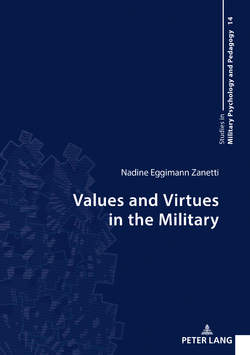Читать книгу Values and Virtues in the Military - Nadine Eggimann Zanetti - Страница 7
На сайте Литреса книга снята с продажи.
ОглавлениеForeword
Military organizations see themselves as value-driven, and therefore it is not surprising that most of the armed forces have a definitive list of values and standards. This is a means of articulating its common ethos and moral basis, and ensuring correct behavior of serving personnel. Moreover, in an era where civilian society’s values seem to be moving ever further away from those of armed forces such a basis becomes more relevant in educating soldiers on the moral character necessary to address the ethical situations they will encounter in military training and even more during military missions.
In general, we assume that values reflect what is accepted by cultures, be it the military organization or the wider population. However, it has not been proven that existing lists of values can be equated with it; they have mostly grown historically and are therefore based not least on traditional ideals, norms, standards, and also top-down guidelines. Robinson (2006) even goes so far as to say that lists of values and virtues produced by most armed forces in the Western world remain inwardly orientated and somewhat old fashioned (p. 266).
The Swiss Armed Forces have deliberately refrained from using an universal canon of values. But the official service regulations refer to certain values in the sections on leadership and education; the Military Ethics Report (2010) also stresses the importance of fundamental values; and finally, values are also part of the content of various leadership courses. On the one hand, this provides at least a certain framework, and on the other hand, the room for maneuver that is desirable in practice. But now one can argue that in a rapidly changing world and in view of our multioption society, specifically for a conscript army, it seems appropriate to create a more solid and binding basis in terms of content by systematically examining the values perceived.
This is precisely the starting point of this research project. Its aim was using scientific methodology to depict and interpret the current understanding of values and virtues; to intensify the dialogue on the culture of values and virtues within the military organization; and to create the conditions for evaluating the impact of military education. With this in mind, qualitative and quantitative data were collected at different hierarchical levels. The resulting comprehensive and representative data set opened up the possibility for comparisons between the different hierarchical levels and provided detailed information on the differences between professional members of the armed forces and members of the militia. Furthermore, a structural factor analysis of the same data set led to five superordinate value factors and four virtue factors, which somehow reflect the values-landscape of the Swiss Armed Forces. For example, the five value domains reflect a culture of respectful, human-oriented conduct and a simultaneous military focus on mission and related duties.
The benefits of the present study are manifold: In contrast to the traditionally established value systems of other military organizations, mostly imposed from above or by history, a value culture is described here from the perspective of today’s members of the Swiss Armed Forces. In addition to this overall picture, it also allows comparisons between relevant subgroups and thus stimulates discussion about the different weighting of the values and virtues. It can also be highlighted that this research project should provide the impetus for self-reflection. Thus, while an officer is, first and foremost, a soldier, the value-oriented behavior of an officer goes above and beyond what is required of soldiers. So, the results presented here can be seen as a binding basis on which the behavior of leaders can be assessed and on which they should reflect themselves – their decisions and actions – regularly. And finally, this study can serve as a starting point for further scientific work such as the systematic recording of the effects of military value education or for comparisons of the understanding of values and virtues in an international context.
Nadine Eggimann Zanetti deserves credit for having had the courage to investigate this complex subject systematically and using scientific methods, thus making a substantial contribution to the research in question and providing a solid basis for practice in a subject of great importance not only for military organizations.
Hubert Annen
References
Robinson, P. (2006). Military Honour and Conduct of War: From Ancient Greece to Iraq. New York: Routledge.
Swiss Armed Forces. (2010). Militärethik in der Schweizer Armee [Military ethics in the Swiss Armed Forces]. Bern, Switzerland: Government Printing Office
